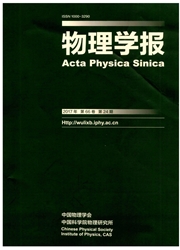

 中文摘要:
中文摘要:
从量子相干性包括l1norm相干性和量子相对熵相干性的角度建立了判定开放量子系统中非马尔可夫过程的方法,并给出了相应的判别条件.作为它们的具体应用,研究了一个两能级系统分别经历相位衰减通道、随机幺正通道和振幅耗散通道作用时对应的非马尔可夫过程发生必须满足的条件.对于三种通道模型,得到了l1norm相干性对系统任意态非马尔可夫过程发生的判别条件,并发现在相位衰减通道和振幅耗散通道中其非马尔可夫过程发生的条件与用其他方式如信息回流、可分性和量子互熵给出的条件是相同的,而在随机幺正通道中给出了一个新的且不完全等价于基于信息回流和可分性对应的条件.至于量子相对熵相干性,在相位衰减通道中得到了对系统任意态的非马尔可夫过程发生的具体条件,并发现该条件也等同于基于信息回流、可分性和量子互熵给出的条件.而在随机幺正通道和振幅耗散通道中得到了系统最大相干态对应的非马尔可夫过程发生的条件.
 英文摘要:
英文摘要:
We propose an approach to measuring non-Markovianity of an open two-level system from quantum coherence perspective including 11 norm of coherence and quantum relative entropy of coherence, and derive corresponding non- Markovian conditions. Further, as a particular application, non-Markovian conditions of an open two-level system undergoing phase damping channel, random unitary channel and amplitude damping channel, respectively are investi- gated. Specifically speaking, for the three channels we obtain non-Markovian conditions based on 11 norm of coherence at any initial state of system, and find that non-Markovian conditions are the same as the conditions of other mea- surements, i.e., information back-flow, divisibility and quantum mutual entropy for the phase damping channel and amplitude damping channel, but non-Markovian conditions new and different from the conditions of other measurements for random unitary channel. On the other hand, for phase damping channel we obtain non-Markovian conditions based on quantum relative entropy of coherence at any initial state of system, which are the same as the conditions of other measures, i.e., information back-flow, divisibility and quantum mutual entropy. However, for the random unitary channel and amplitude damping channel we obtain non-Markovian conditions at maximally coherent state of system.
 同期刊论文项目
同期刊论文项目
 同项目期刊论文
同项目期刊论文
 期刊信息
期刊信息
